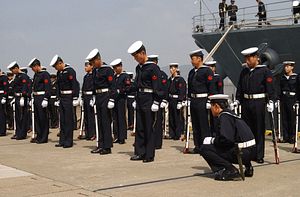Japan’s Ministry of Defense (MOD) officials are planning to submit a proposal to the Diet as soon as early March to amend the MOD’s decision-making structure. The proposal aims to put Japan’s Self-Defense Force (SDF) officers on equal footing with their civilian bureaucratic counterparts. SDF personnel as well as current Diet members who formerly served in the SDF support the amendment, which is designed to give uniformed personnel greater control over SDF tactical operations than they currently have.
The move to rank defense-related bureaucrats and SDF personnel equally, so that they would serve the defense minister in the same capacity, stems from the government’s desire to correct the perception that ‘the suits’ are controlling ‘the uniforms.’ Under the current ministry establishment law, bureaucrats “assist the defense minister” when he/she instructs the Joint Staff chief and the chief of each SDF arm — the Ground Self-Defense Force (GSDF), the Maritime Self-Defense Force (MSDF), and the Air Self-Defense Force (ASDF). This ensures civilian input on instructions issued by the defense minister, including directives such as orders for SDF units and personnel changes — much to the frustration of uniformed personnel.
Under the proposed reform, the chiefs of staff of the SDF branches will support the minister as equals to the director-general of ministry bureaus and the director-general of the Minister’s Secretariat. Also, SDF units assigned to respond to a contingency (e.g. missile launches, large-scale disasters) will be able to report directly to the minister and the minister can instruct SDF units directly through the chief of staff of each SDF branch.
The purpose of these reforms is to allow the defense minister and SDF to react more quickly in times of crises by removing cumbersome layers of control. The proposed amendment to the ministry establishment law would also help ensure consistency across different pieces of legislation, as the Self-Defense Forces Law already lists “assistance” for the defense minister as a task for the Joint Staff chief and other high-ranking SDF officials to perform.
The bill also would delegate the task of various duties related to the operation of SDF units to the Joint Staff Office (comprised mostly of SDF members) exclusively. Such duties are currently shared between defense-related bureaucrats and SDF personnel.
A new “defense equipment agency” will also be created to centralize research, development, and purchase of defense equipment. Such an agency will hopefully help reduce costs, increase collaboration with private entities, and better prevent scandals such as bid-rigging on procurement and leaks of defense information. This new body will also manage defense-related exports under the three principles developed by the Cabinet. These principles restrict defense equipment transfers only to cases where it will help promote peace and international cooperation.
While sources assure Yomiuri Shimbun that “the nation’s adherence to the principle of civilian control will remain unchanged as a basis of its defense system under the new legislation,” there has been a predictable and furious domestic reaction to what is seen as an erosion of civilian control over the military. An editorial in the left-leaning Asahi Shimbun criticizes the proposed law and urges the SDF to remain “low key” in order to keep the trust of the public. While conceding that the proposed law would allow for faster responses to crises by the SDF, the editorial complains that “civilian control would be in danger of losing its intended purpose if the bureaucrats are kept out of the decision-making process.”
Detractors of MOD’s proposed law point to the lessons of history to argue that the military must be kept on a tight leash to prevent another tragedy. Civilian control has been a cherished principle of Japan’s civil-military relations and a defining feature of its politico-military culture ever since WWII, when the military’s independent actions dragged the country into a war that victimized the rest of Asia as well as Japan’s own population.
The challenge for the MOD is to find a balance between the ideal of absolute civilian control over the military and the pragmatic need to operate better and faster — one that is acceptable to the general Japanese public.

































